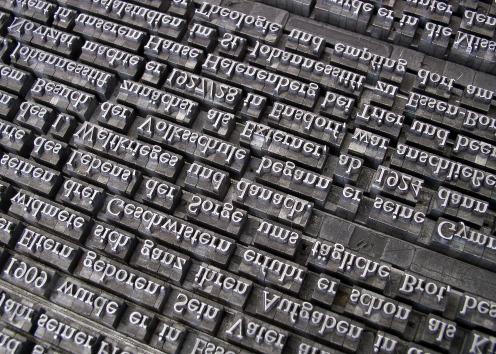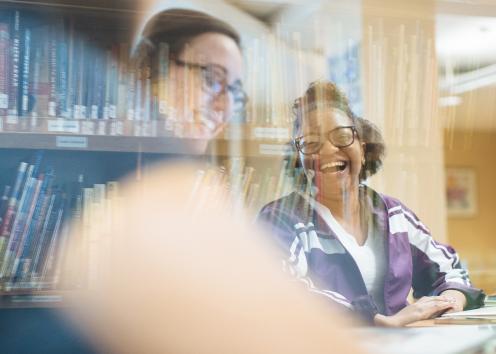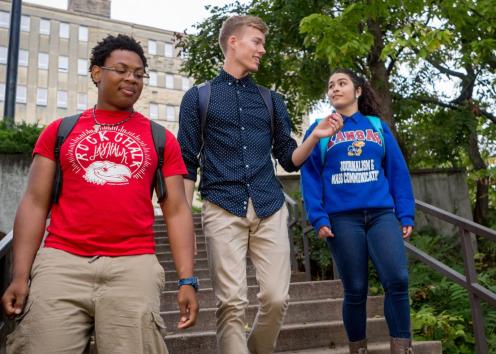Capstone Courses Spring 2026
ENGL 551: Fiction Writing II
Instructor: Adam Desnoyers
52851 | TuTh 11:00 AM-12:15 PM | Wescoe 4019
51609 | TuTh 2:00-3:15 PM | Wescoe 4019
This course is an intensive exploration of the ideas and
techniques of fiction writing within the form of the
short story, with primary emphasis on the careful
analysis and discussion of student works-in-progress.
We will read a variety of published stories each week
and discuss narrative structure and style, imagery and
metaphor, use of scene and exposition, dialogue, and
the various points of view. Requirements: Students will
attend class regularly and participate actively in
discussion. They will produce three short stories of
their own during the semester, which they will submit
to the class to be workshopped. They will also provide
critiques for their peers’ stories as these are
workshopped. Lastly, students will revise their own
stories for inclusion in their final portfolio.
Instructor: Silvia Park
55811 | M 7:00-9:00 PM | Wescoe 4019
Instructor: Brian Daldorph
44883 | M 5:30-8:20 PM | Regnier 152 (Edwards)
We'll study the basic elements of short story writing,
including characterization, narrative development and
dialogue. Most of the classes we will be workshopping
student-written fiction. Students will be expected to
complete several introductory exercises and three short
stories, or the equivalent, perhaps three chapters of a
novel. 551 students will be required to complete several
extra requirements. No textbook. Readings on Canvas
and handouts. Meets with ENGL 351.

ENGL 552: Poetry Writing II
Instructor: Meagen Youngdahl
55812 | TuTh 12:30-1:45 PM | Fraser 113
This course will build upon lessons in craft and poetics from Poetry I with the goal of helping each student to further explore and shape their particular style and approach to poetry writing. We will do this through an abundance of reading, writing, discussion, workshopping, and revision, as well as frequent generative writing exercises. Students will also be asked to familiarize themselves with the local poetry community (on campus and off) by attending readings and other poetry-centered events. By the end of the course, each student will have produced a chapbook-length collection (20-30 pages) of writing organized around a central theme, idea, or experience, as well as a self-reflection paper discussing how their work might fit into (and add to) the broader poetry landscape.

ENGL 555: Nonfiction Writing II: Advanced Workshop in the Essay
Instructor: Doug Crawford-Parker
44889 | TuTh 9:30-10:45 AM | Fraser 225
English 555 is a creative writing workshop focused on continuing students’ development as essayists to expand their ability in the genre’s myriad possibilities of both form and content. The course focuses on student work through the peer review workshop, but we also read outside to understand better some of the potential, possibilities, and pitfalls of the essay form. Students write three essays and contribute regular critiques of one another’s work. One essay is then revisited at semester’s end as part of a larger revision project. Students are required to take part in a group reading of their own work and do several shorter presentations. The workshop format of the course demands a high level of student participation, both in degree and quality. Students can expect to be challenged intellectually and creatively in producing new and original writing and engaging with their fellow students to think about the process of writing as essayists.

ENGL 569: Modernism
Instructor: Dr. Zay Dale
52796 | MW 2:00-3:15 PM | Wescoe 4021
This course will explore some of the definitions, texts, and aesthetics associated with literary modernism, especially transatlantic modernism, as well as some of the writers and artists in dialogue with modernist approaches. Prerequisite: At least one 300- or 400-level ENGL course.

ENGL 580: Rhetoric and Writing: Digital and Multimodal Rhetorics
Instructor: Mary Jo Reiff
55813 | TuTh 11:00 AM-12:45 PM | Wescoe 4037
In this course, we will examine the impact of digital media and multimodal discourse on ourselves and our culture by rhetorically analyzing and composing a variety of media genres—from blogs, to video content, to podcasts, to social media. We will examine the ways that multiple modes of communicating (through language, images/visuals, sound, embodied movement, spatiality) can shape messages and affect audiences and how digital media can create new spaces for dialogue, collaboration, and mobilization around issues, influencing the circulation and uptake of actions. Assignments will include a digital/multimedia literacy autobiography (in which you will explore your own experiences of communicating within digital and multimedia contexts), a transmedia analysis of messages across two different mediums; a multimedia presentation on how new media/multimodality impacts your professional area of interest; and a final portfolio that uses multimedia to create a professional digital profile. Required readings will be posted to Blackboard and will include various articles in Rhetoric and Composition focused on multimedia writing, multimodal composition, digital rhetoric, visual rhetoric, and sonic rhetoric.

ENGL 590: Studies in: Programming for Digital Humanities
Instructor: Wen Xin
53519 | TuTh 2:00-3:15 PM | Wescoe 4074
New methods in Digital Humanities (or DH) have enabled us to engage with a far larger collection of texts and uncover more nuanced patterns than traditional approaches, such as close reading and human analysis, typically permit. This course will introduce humanities students to the foundational skills of computational text analysis, a core component of DH, in the R programming language. We will begin by learning the fundamentals of programming and data management in the R programming language. The course will then examine micro-level textual analyses—such as n-gram frequency, lexical richness, dispersion, and keyword-in-context (KWIC)—as well as macro-level techniques including term frequency–inverse document frequency (TF-IDF), sentiment analysis, topic modeling, word embeddings, and bibliometric analysis. Throughout the course, we will also emphasize text visualization as a key practice for interpreting and presenting results across methods. This course will expand your suite of skills as you pursue humanities questions. You will be expected to complete assignments that exercise in-class instructions, a group project where you work with your group members to plan, execute, and report your textual analysis, as well as a critical reflection upon computational textual analysis. No prior technical skills are expected in this course. We will start with the very basics of programming. Bring your laptops!

ENGL 598: Honors Proseminar: Speculative Worlds
Instructor: Silvia Park
51450 | M 3:30-6:00 PM | Wescoe 4021













